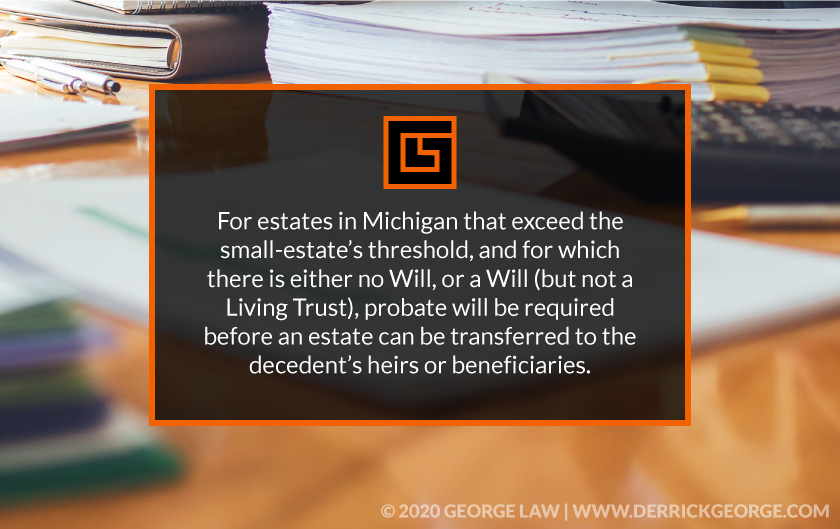Probate is how an estate gets settled with court supervision. A person, often a surviving spouse or adult child, is (i) appointed by the court if there is no Will, or (ii) nominated by the Will. Once appointed, this person, “executor” or “Personal Representative,” may (i) gather and value the estate’s assets, (ii) pay bills/taxes, and, (iii) distribute assets to heirs/beneficiaries.
Call George Law at (248) 470-4300 for more details and any assistance that you need.
Probate’s purpose is to prevent fraud. It freezes the estate until a judge determines that (i) the Will is valid, (ii) relevant people have been notified, (iii) the estate’s property has been identified and appraised, (iv) the creditors and taxes have been paid. When that’s done, the court issues an Order distributing the property and the estate is closed.
Not all estates must go through probate though.
First, if an estate falls below a certain threshold, it is considered a “small estate” and doesn’t require court supervision to be settled.

Second, not all assets are subject to probate. Some assets transfer automatically when the owner dies with no probate required. The most common kinds of assets that pass without probate are:
- Joint Tenancy Assets – when one joint tenant dies, the surviving joint tenant becomes the owner of the entire asset, without the need for a court order. This is called “right of survivorship.” For example, if a house is owned this way, “Jane Sage and John Sage, as joint tenants,” and Jane dies, John owns the entire house.
- Tenancy by the Entirety or Community Property with Right of Survivorship – these forms of property ownership function like joint tenancy in that the survivor owns the entire property at the death of the other tenant, but are only available to married couples.
- Beneficiary Designations – retirement accounts and life-insurance policies have named beneficiaries. Upon the death of the account or policy owner, these beneficiaries are entitled to the assets in the account or the proceeds of the policy.
- Payable on Death Accounts/Transfer on Death Accounts – bank and brokerage accounts can have designated beneficiaries, too. The account owner can fill out forms to designate who should receive the account assets after their death.
Third, if a decedent created a Living Trust to hold large assets, that estate won’t go through probate, unless the assets outside the trust add up to more than Michigan’s small-estate limit. That’s why that Living Trust was created, to avoid probate after the death of the trust’s Grantor.
But for estates in Michigan that exceed the small-estate’s threshold, and for which there is either no Will, or a Will (but not a Living Trust), probate will be required before an estate can be transferred to the decedent’s heirs or beneficiaries.

The general procedure required to settle an estate via probate in Michigan is set out in the Uniform Probate Code, a set of probate procedures that 15 states have adopted.
Under the UPC, Michigan has 3 kinds of probate proceedings: (i) informal, (ii) unsupervised, and (iii) supervised formal.
Informal Probate
Most probate proceedings in Michigan are informal. You can use it when the heirs and beneficiaries are getting along, there are no creditor problems to resolve and you don’t expect any trouble.
First, file an application with the probate court to serve as the “personal representative” of the estate. (This is what most people think of as the “executor”). Once your application is approved, you may act for the estate. Usually, the court will give you a “Letters Testamentary.”
Once you get the letters, you need to do these things:
- Send out formal notice to heirs, beneficiaries, and creditors
- Publish a notice in a local newspaper to alert other creditors
- Provide proof that you’ve mailed notices and published the notice
- Prepare an inventory and appraisal of the estate’s assets
- Keep the property safe
- Distribute the property (when the estate closes)
Once the property’s been distributed, you close an informal proceeding by filing a “final accounting” with the court and a “closing statement” that says you’ve paid all the debts and taxes, distributed the property, and filed the accounting.

Unsupervised Formal Probate
A formal probate, even an unsupervised one, is a court proceeding. A judge must approve certain actions taken by the Personal Representative, such as selling estate property, distributing assets, or paying an attorney. The judge can settle disputes between beneficiaries over the distribution of assets, the meaning of a Will, or the amounts due to creditors. The informal probate process won’t work if there are disputes – that’s when a court gets involved.
Supervised Formal Probate
A supervised formal probate is one in which the court steps in to supervise the entire probate process. The court must approve the distribution of all property in such a proceeding.
A skilled lawyer can make a huge difference. Call George Law at (248) 470-4300 for more details and any assistance that you need.

 Menu
Menu